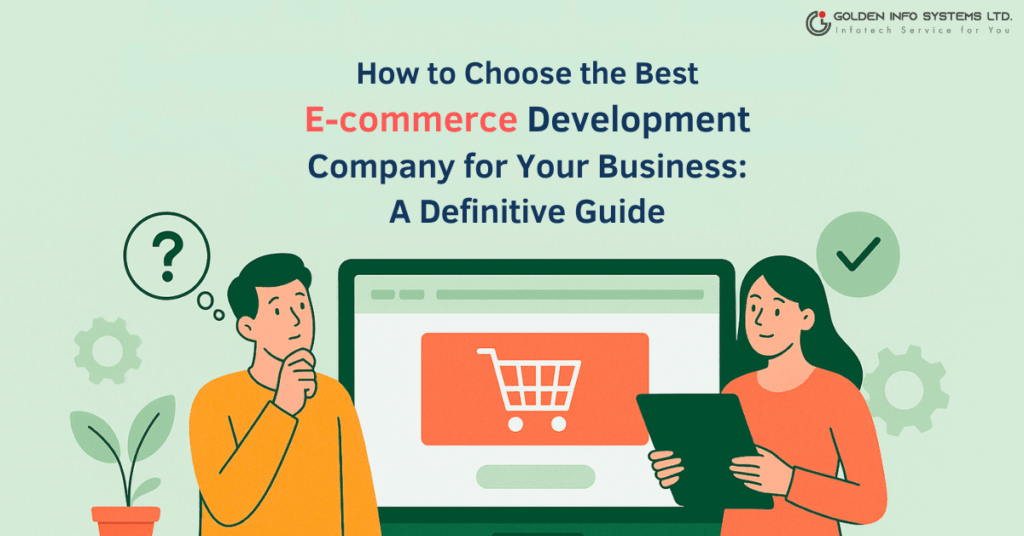In the bustling digital marketplace of today, your e-commerce website isn’t just a platform for transactions; it’s your virtual storefront, your brand ambassador, and the engine of your business growth. The difference between a thriving online store and one that struggles to gain traction often comes down to the expertise of the team that built it.
Choosing the right e-commerce development company is one of the most critical business decisions you’ll make. It’s not just about hiring coders; it’s about finding a long-term partner who understands your vision, navigates the technical complexities, and is invested in your success. A great partner builds more than a website; they build an experience that converts visitors into loyal customers.
But with thousands of agencies promising the world, how do you find the one that will actually deliver? This guide will walk you through everything you need to know to make an informed decision and select the best e-commerce development company for your unique business needs.
Step 1: Laying the Foundation – Define Your E-commerce Project
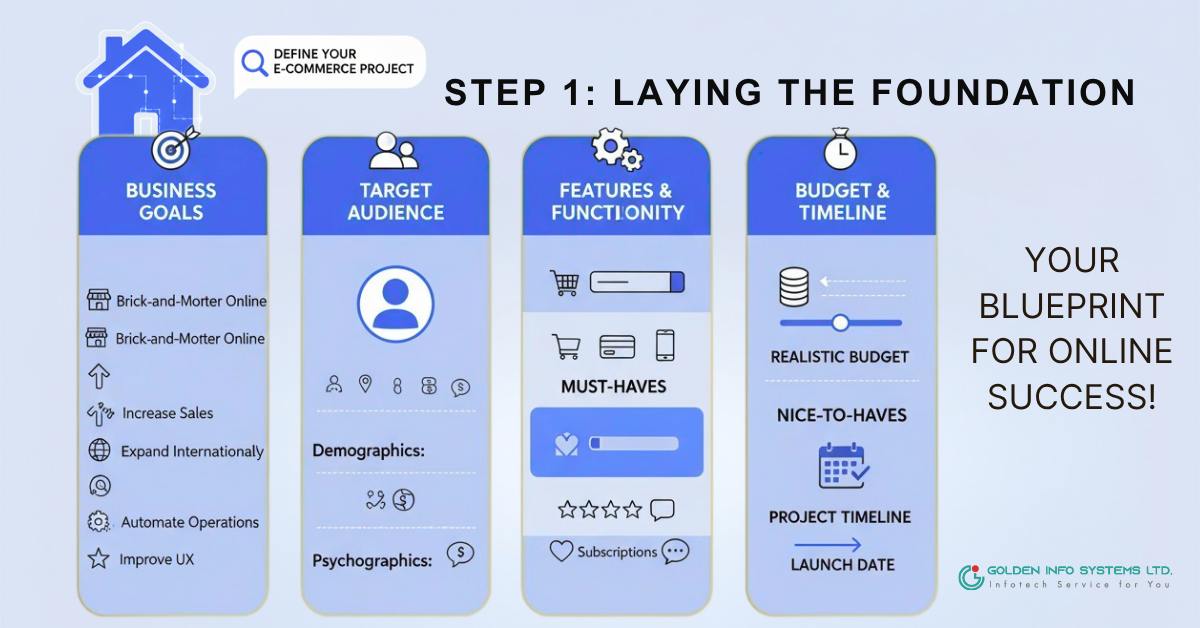
Before you can find the perfect partner, you need to understand exactly what you’re trying to build. A clear vision is your most powerful tool. Rushing this stage is like trying to build a house without a blueprint.
Pinpoint Your Business Goals
What is the primary purpose of your e-commerce store? Be specific.
- Are you a brick-and-mortar store moving online for the first time?
- Are you looking to increase online sales by 50% in the next year?
- Do you want to expand into international markets?
- Is your goal to automate inventory management and reduce operational overhead?
- Do you need to improve the customer experience on your existing, outdated site?
Your goals will dictate the features, technology, and strategy required.
Understand Your Target Audience
Who are you selling to? Creating detailed customer personas will help your development partner design an experience tailored to them. Consider:
- Demographics: Age, location, income, etc.
- Psychographics: Hobbies, values, lifestyle.
- Shopping Habits: Are they bargain hunters or do they value quality? Do they shop on their phones during their commute or on a desktop at home?
A site designed for tech-savvy millennials will look and feel very different from one designed for older, less-technical customers.
Outline Essential Features and Functionality
Create a “must-have” and a “nice-to-have” list of features.
Must-Haves (The Basics):
- Secure and intuitive shopping cart
- Multiple payment gateway integrations (Stripe, PayPal, local options)
- Easy-to-use product management system (for adding/editing products)
- User account creation and management
- Mobile-responsive design
- Basic search and filtering capabilities
- Order management system
Nice-to-Haves (For Growth and Enhanced Experience):
- Advanced search with AI-powered suggestions
- Customer reviews and ratings
- Wishlist functionality
- Subscription or recurring payment models
- AR (Augmented Reality) product try-on features
- Personalized product recommendations
- Live chat or chatbot integration
- Loyalty programs
Set a Realistic Budget and Timeline
Be transparent about your budget. An e-commerce website is an investment, not an expense. Costs can range from a few thousand dollars for a basic template-based site to hundreds of thousands for a complex, custom-built enterprise solution. Having a realistic budget helps agencies propose a solution that fits your financial reality. Similarly, establish a desired launch date, but be flexible, as quality development takes time.
Step 2: Know Your Options – Understanding E-commerce Platforms
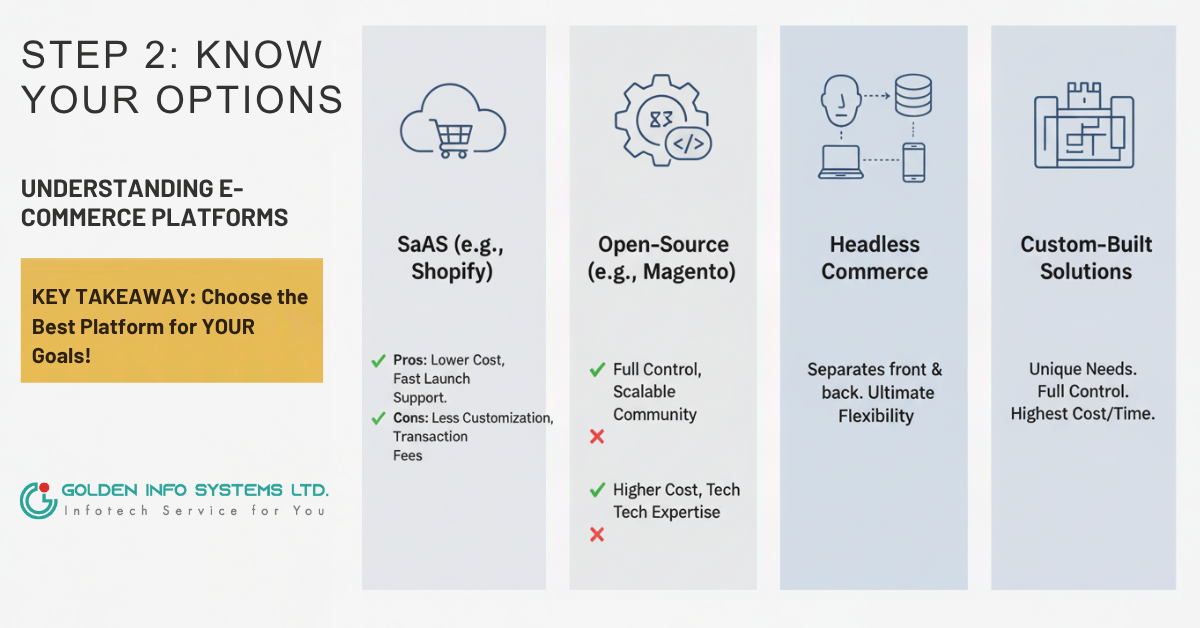
Your development company will help you choose the right technology, but it’s crucial to have a basic understanding of the landscape.
- SaaS (Software as a Service) – e.g., Shopify, BigCommerce: These are all-in-one, subscription-based platforms. They are user-friendly, quick to set up, and handle hosting and security for you.
- Pros: Lower initial cost, excellent support, fast launch.
- Cons: Less customization, transaction fees, you don’t “own” the platform.
- Open-Source – e.g., Magento (Adobe Commerce), WooCommerce (for WordPress): These platforms are free to download, but you are responsible for hosting, security, and development. They offer limitless customization.
- Pros: Full control and ownership, highly scalable, large community for support and extensions.
- Cons: Higher development and maintenance costs, requires significant technical expertise.
- Headless Commerce: This modern approach separates the front-end (the “head” or what the customer sees) from the back-end (the e-commerce engine). This allows for unparalleled creativity and the ability to deliver content to any device—from a website to a mobile app to an IoT device. It’s the ultimate choice for flexibility.
- Custom-Built Solutions: For businesses with truly unique requirements that no existing platform can meet, a solution built from scratch may be necessary. This is the most expensive and time-consuming option but offers complete control.
Key Takeaway: The right platform depends on your budget, technical comfort level, and need for customization. A good development company will not push one platform but will recommend the best one for your goals.
Step 3: The Search – What to Look for in a Top E-commerce Development Company
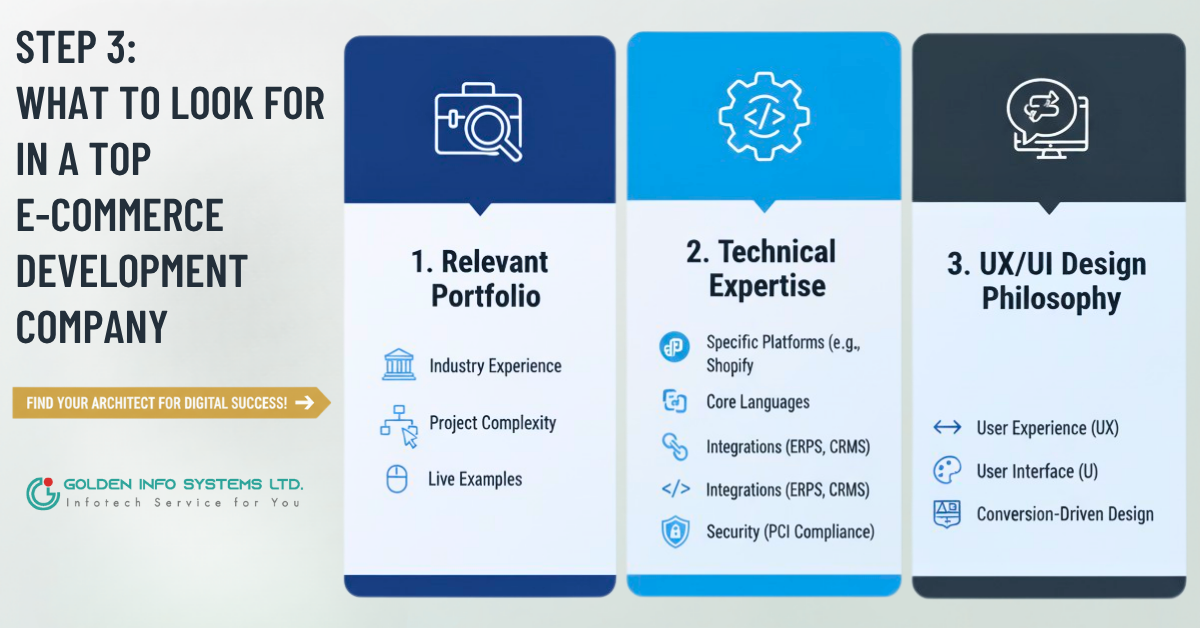
Now that you have your blueprint, it’s time to find the architect. Here are the non-negotiable qualities your future partner must possess.
1. A Strong, Relevant Portfolio
This is their resume. Don’t just look for pretty pictures; dig deeper.
- Industry Experience: Have they built stores in your industry or a similar one? They will understand your unique challenges and customer expectations.
- Project Complexity: Do they only build simple template sites, or have they handled complex integrations and custom features similar to what you need?
- Live Examples: Click through their portfolio links. How do the sites perform? Are they fast? Are they easy to navigate? Try adding an item to the cart and going through the checkout process.
2. Technical Prowess and Platform Expertise
The company must be masters of the technology they work with. If you’re leaning towards Magento, you need a certified Magento developer, not a generalist web designer. Look for expertise in:
- Specific Platforms: Proven experience in Shopify, Magento, WooCommerce, etc.
- Core Languages: Proficiency in languages like PHP, JavaScript, Python.
- Integrations: Experience with integrating third-party systems like ERPs, CRMs, and various payment gateways.
- Security: Deep knowledge of e-commerce security protocols (PCI compliance, data protection).
3. A User-Centric (UX/UI) Design Philosophy
A beautiful website that is difficult to use will not sell products. User Experience (UX) is about how easy and enjoyable the site is to use. User Interface (UI) is about how it looks and feels. Your chosen company should be obsessed with both. They should talk about conversion rates, customer journeys, and A/B testing, not just color palettes and fonts.
4. A Mobile-First Development Approach
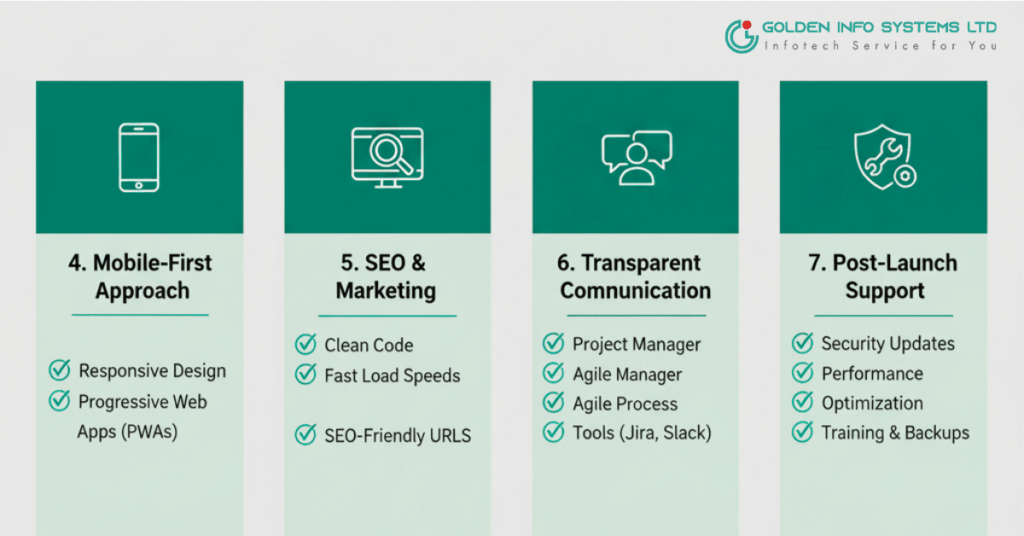
Over half of all online traffic comes from mobile devices. “Mobile-friendly” is no longer enough; “mobile-first” is the standard. This means the company designs the experience for the smallest screen first and then scales up. Ask them about their experience with responsive design and Progressive Web Apps (PWAs), which offer an app-like experience in a mobile browser.
5. In-House SEO and Digital Marketing Knowledge
What good is the world’s best online store if no one can find it? A development company that understands Search Engine Optimization (SEO) will build your site on a solid foundation for Google to find and rank. This includes:
- Clean, indexable code
- Fast page load speeds
- Proper use of heading tags and metadata
- SEO-friendly URL structures
A company that builds with marketing in mind will save you thousands of dollars and months of headaches later on.
6. Transparent Communication and Project Management
This is arguably the most important factor. A successful project relies on clear, consistent communication.
- Single Point of Contact: Will you have a dedicated project manager?
- Process: Do they have a clear, documented process (e.g., Agile, Scrum)?
- Tools: What tools do they use to manage the project and communicate updates (e.g., Jira, Asana, Slack)?
- Responsiveness: How quickly do they respond to emails and calls?
7. Comprehensive Post-Launch Support and Maintenance
Launching your website is the beginning, not the end. E-commerce stores require ongoing attention. A great partner will offer a clear plan for:
- Security updates and patches
- Performance monitoring and optimization
- Bug fixes
- Regular backups
- Training for your team
Avoid companies that disappear the moment the final invoice is paid. Look for a partner interested in a long-term relationship.
Step 4: The Vetting Process – How to Properly Evaluate Candidates
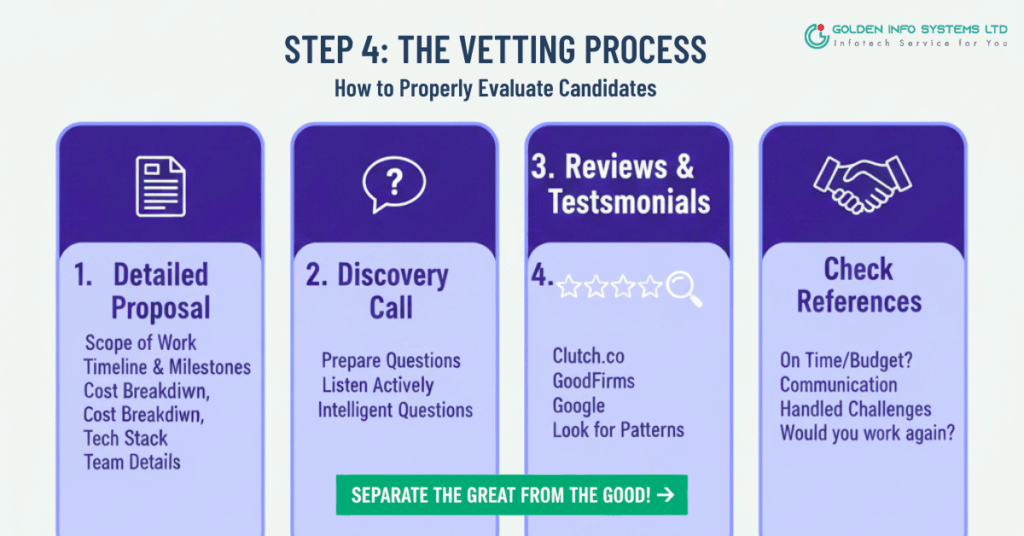
You’ve shortlisted a few companies that look promising. Now it’s time to separate the great from the good.
- Request a Detailed Proposal: A generic, one-page quote is a red flag. A professional proposal should include a detailed scope of work, a project timeline with key milestones, a full cost breakdown, the technology stack they plan to use, and details about the team who will work on your project.
- Schedule a Discovery Call: This is your chance to interview them. Prepare your questions in advance. Pay attention not just to what they say, but how they say it. Do they listen to your needs or just try to sell you their services? Do they ask intelligent questions about your business?
- Read Reviews and Testimonials: Look for reviews on third-party sites like Clutch.co, GoodFirms, and even Google. Look for patterns in the feedback. One bad review might be a fluke, but several mentioning poor communication is a major red flag.
- Check Their References: This is a crucial step that many people skip. Ask for contact information for 2-3 of their past clients. Prepare questions for them:
- Was the project completed on time and on budget?
- How was the communication throughout the process?
- How did they handle unexpected challenges or changes?
- Would you work with them again?
Step 5: Spotting the Red Flags
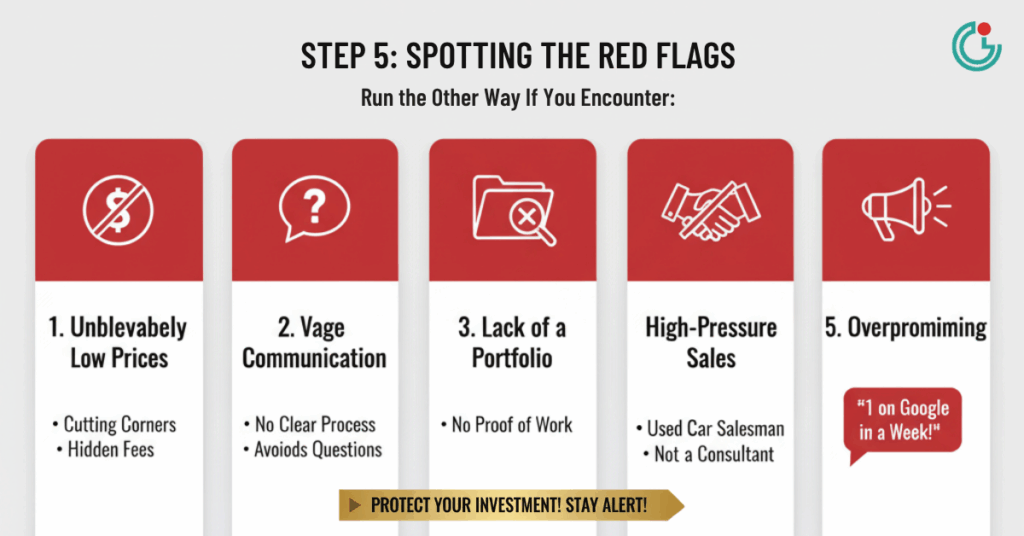
While you look for the green lights, be equally aware of the red ones. Run the other way if you encounter:
- Unbelievably Low Prices: Quality work costs money. An extremely low bid often means they are outsourcing to inexperienced developers, cutting corners, or will surprise you with hidden fees later.
- Vague Communication: If they can’t clearly explain their process or answer your questions directly, it’s a bad sign.
- Lack of a Portfolio: If they can’t show you what they’ve done, they likely haven’t done much.
- High-Pressure Sales Tactics: A true partner will act as a consultant, not a used car salesman.
- Overpromising: If it sounds too good to be true (“We’ll make you #1 on Google in a week!”), it is.
Introducing a Trusted Partner: Golden Info Systems Ltd.
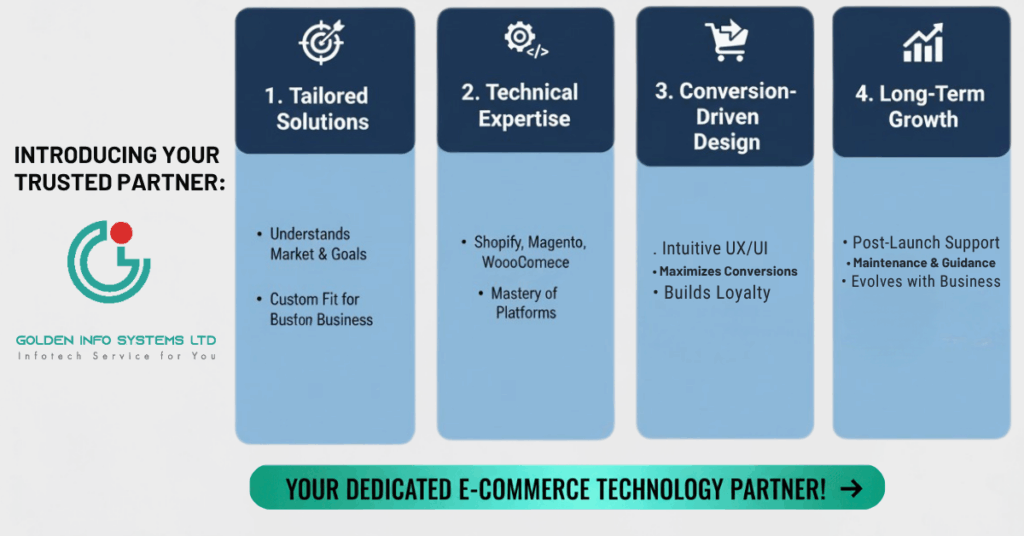
Navigating this process can be daunting, which is why it’s helpful to see what an ideal partner looks like in practice. A company that consistently embodies these positive qualities is Golden Info Systems Ltd. They have established themselves as a premier e-commerce development partner by focusing on the principles that truly matter for business success.
What sets a company like Golden Info Systems Ltd. apart is its commitment to a partnership approach. They understand that building a powerful e-commerce platform isn’t just about writing code; it’s about understanding the core of your business and translating your vision into a digital reality.
Here’s how they align with the key qualities of a top-tier company:
- A Focus on Tailored Solutions: Golden Info Systems Ltd. excels at moving beyond one-size-fits-all templates. They invest time in the discovery phase to understand your specific market, audience, and goals, ensuring the final product is a perfect fit for your business.
- Deep Technical Expertise: Whether your business requires the rapid deployment of a Shopify store, the extensive customization of WooCommerce, or the enterprise-level power of Magento, their team possesses the deep technical expertise to execute flawlessly. They don’t just use the platforms; they master them.
- Conversion-Driven Design: Their portfolio demonstrates a clear focus on clean, intuitive, and beautiful design (UX/UI) with one primary goal: to maximize conversions. They design customer journeys that are seamless, encouraging repeat business and building brand loyalty.
- A Commitment to Your Long-Term Growth: Golden Info Systems Ltd. views the launch of your site as the starting line. They structure their services to include robust post-launch support, maintenance, and strategic guidance to ensure your platform evolves and continues to deliver value as your business grows.
When you engage with a company like Golden Info Systems Ltd., you’re not just hiring a vendor; you’re gaining a dedicated technology partner invested in your success.
If you’re looking for an e-commerce development company that ticks all these boxes, we highly recommend reaching out to the expert team at Golden Info Systems Ltd. for a consultation.
Conclusion: Your Partner in Digital Growth
Choosing an e-commerce development company is a long-term investment in your business’s future. The right partner will do more than just build a website; they will provide the technological foundation and strategic insight you need to thrive in the competitive online landscape.
Take your time, do your research, and trust your gut. By following the steps outlined in this guide—defining your needs, understanding your options, vetting candidates thoroughly, and looking for a true partner—you can confidently select a company that will help you achieve your business goals and set you up for success for years to come.
Would you like me to help you draft a list of specific questions to ask potential e-commerce development companies during your discovery calls?
Frequently Asked Questions (FAQ)
Here are answers to some of the most common questions business owners have when starting their e-commerce development journey.
1. How much does an e-commerce website cost?
This is the most common question, and the answer is: it depends entirely on the complexity. Costs can be broken down into a few general tiers:
- Basic Template-Based Site ($3,000 – $10,000): Using a platform like Shopify with a pre-built theme and minimal customization. This is great for small businesses or startups with a limited product catalog.
- Customized Mid-Range Site ($10,000 – $30,000): This often involves a platform like WooCommerce or a more customized Shopify/BigCommerce store. It includes custom design elements, specific feature integrations, and more advanced functionality.
- Enterprise-Level Custom Site ($30,000+): This is for a fully custom solution, often built on a powerful platform like Magento or using a headless architecture. It includes complex integrations (ERP, CRM), unique user features, and is built for high traffic and large product catalogs.
Always get a detailed proposal that breaks down all costs.
2. How long will it take to build my e-commerce website?
Similar to cost, the timeline depends on the project’s scope.
- Basic Site: 4-8 weeks
- Customized Mid-Range Site: 2-4 months
- Enterprise-Level Custom Site: 4-9+ months
Factors that influence the timeline include the complexity of the design, the number of custom features, integrations with other systems, and how quickly you (the client) can provide feedback and content.
3. What do I need to provide to the development company?
To ensure a smooth process, you should have the following ready:
- Brand Guidelines: Your logo, color palette, and fonts.
- Content: Product descriptions, photos, videos, and “About Us” page copy. High-quality product photography is essential.
- Domain Name: You should have your desired domain name purchased.
- Payment Gateway Account: Details for your preferred payment processor (like Stripe or PayPal).
- A Clear Point of Contact: Designate one person from your team to be the main decision-maker to provide feedback and approvals.
4. Will I be able to manage the store myself after it’s launched?
Absolutely! Any professional e-commerce development company will build your site on a Content Management System (CMS) designed for this purpose. They should provide comprehensive training to you and your team on how to:
- Add, edit, and remove products.
- Manage inventory and pricing.
- Process orders and view customer information.
- Update website content like blog posts or banners.
Ensure that training is included in the project proposal.
5. What are the ongoing costs associated with an e-commerce website?
Launching the site is just the beginning. Be prepared for recurring costs, which typically include:
- Website Hosting: The server space where your website files are stored.
- Domain Name Renewal: An annual fee.
- Platform Fees: Monthly subscription fees if you’re using a SaaS platform like Shopify.
- Maintenance & Support Plan: A monthly retainer for security updates, bug fixes, and technical support. This is highly recommended to keep your store secure and running smoothly.
- SSL Certificate: An annual fee to ensure your site is secure (often included with hosting).
- Premium Plugins/Apps: Annual or monthly fees for any specialized functionality.











